Do Jewish Day School Students Have an Advantage?
There are many more factors that go into choosing a school than just statistics... including the cost of Jewish education, which is an expensive prospect.
Parents face a host of decisions as their children grow. Some are more important than others, but few are quite as difficult as the choice of what school to send their child. While we tried to simplify it statistically as much as possible, there are many more factors that go into choosing a school than just numbers.
From a financial perspective, there are countless challenges facing both schools and parents. A few of Jewish Atlanta’s education leaders spoke to the AJT about the challenges of making Jewish education accessible.
In addition to cost, dozens of other factors play a role in choosing the right high school. Religious beliefs, size, atmosphere and friendships can be pivotal for both students and their parents. With all that in mind, the AJT spoke to two students and their parents to learn a little more about the factors at play in choosing a high school after growing up at Jewish day school, kindergarten through eighth grade.
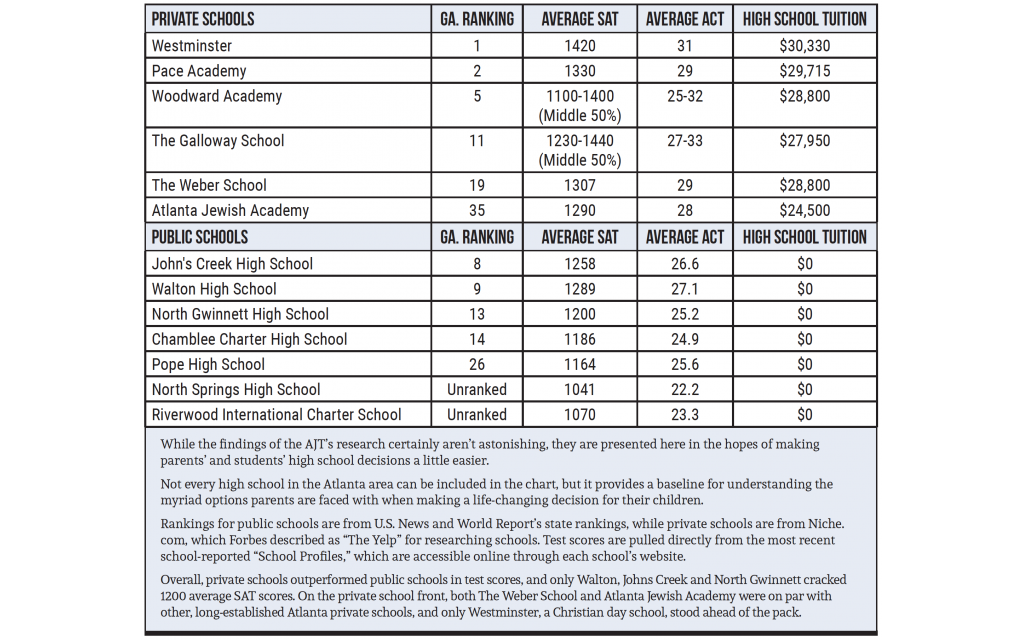
 Carly Judenberg: GPA is 4.40
Carly Judenberg: GPA is 4.40
Following in her older sister’s footsteps, Carly Judenberg made the transition from Jewish day school to public school in ninth grade, unsure of what to expect, but excited for a new environment.
Carly’s mother, Shari Judenberg, explained that when her older daughter, Jenny, was preparing to graduate from The Epstein School and started looking at high schools, the Jewish options didn’t seem to fit her interests.
“My husband was really hell-bent to send them to Jewish day school all the way through high school,” Shari said. “She had been in a small Jewish environment for so long that she was really ready to get out of her comfort zone.”
When it came time for Carly to think through the same choice, her feelings were very similar. “I was really excited for the new experience because I knew that I would only know one or two kids going to Walton High School with me from Epstein. It really was an opportunity to be in a whole new environment.”
She pointed to the freedom she gained in her schedule – not having to fit Judaic studies alongside her other classes – as one of the bigger perks of choosing public school. “I had more opportunities to take classes of my own choosing, like macroeconomics,” she said.
There was still some adjustment when first transitioning from a smaller, tight-knit environment to a larger school. “I was really surprised at the size of the classrooms, and how many students there were in each class,” she said. “That was really shocking to me.”
Placing a high value on the freedom she’s felt at Walton, Carly explained that knowing that no one was watching her directly gave her a sense of responsibility for her own actions that she hadn’t felt previously.
She added that she thinks her experience at a Jewish day school gave her a tangible leg-up academically going into high school. She explained that it helped in the fields of history and languages, but especially in mathematics. “I find myself ahead of a lot of my peers, which I attribute to Epstein,” she said.
“One of the teachers at Walton told me that she could always tell who the Epstein kids were because they weren’t afraid to speak in class,” Shari said. “Epstein’s Socratic method really forces the kids to participate and think hard.”
Perhaps one of the most nerve-wracking parts of finding oneself in a new school environment is making new friends, but Carly explained that she relished the challenge.
“I had grown up with all the kids at Epstein, and as I got older there were very few new kids entering the school each year,” she said. “Remembering how to make new friends was refreshing. I’ve learned a lot more about other cultures and it has really given me the ability to branch out.”
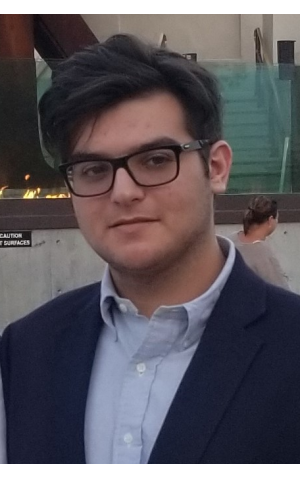 Gabriel Weiss: GPA is 4.16
Gabriel Weiss: GPA is 4.16
Gabriel Weiss started at Epstein but transferred to Atlanta Jewish Academy for middle school after the 2014 merger of Greenfield Hebrew Academy and Yeshiva Atlanta.
“We thought that we wanted Gabe to go to Jewish high school, so we went with AJA,” said his father, Cliff.
When the time came to decide on high school plans, Cliff explained that he and Gabe, who live in the Walton High School district, discussed their options.
“We considered going to Walton, but it was really big and going from a small Jewish school to a large public school was really daunting,” Gabe said. “There’re thousands of kids and so that was one reason we decided to stay at AJA.”
The high academic standard was one factor that weighed heavily on Cliff’s mind when making the decision.
“I kind of thought that maybe we’d be sacrificing that by going to a Jewish school, but one of the things that we’re pleasantly surprised with seeing year after year is some of the kids at AJA are getting accepted into all of the Ivy League schools, and the standardized test scores are just as high as the best public and private schools,” Cliff said.
Gabe focused on the perks of going to a smaller, Jewish high school.
“Because it’s a smaller school it’s much more personalized, and I’m able to get the attention I need and to explore other things outside of school,” he said, adding that he’s known 15 of his classmates since sixth grade. “We’ve grown up with each other and it’s a very close group.”
In looking forward to college, Gabriel explained that there were a few key standards he had when examining his options.
“I would say a school that provides both a safe Jewish bubble for me, where I can express my Judaism, but also a place where I can explore other people and cultures,” he said.
Jewish Heads of School Talk Affordability
It’s no secret that a full-time Jewish education is an expensive prospect and given everything that goes into it — from knowledgeable staff and teachers, to kosher meals and afterschool activities — the cost is not surprising. Keeping those experiences accessible to every Jewish family can be a mammoth problem.
Simply starting a child at day school in first grade and allowing them to continue on that journey through the end of high school could easily cost more than $200,000, and that’s not even factoring for increases in tuition year after year.
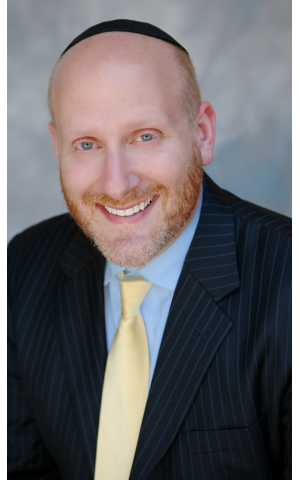
Three of Jewish Atlanta’s heads of school talked to the AJT about the increasing costs, demands and challenges of Jewish education in Atlanta.
“Day school is the most immersive way that the child can connect to their identity and their history,” said Rabbi Ari Leubitz, head of the Atlanta Jewish Academy. “I believe that it should be accessible to all children irrespective of their socioeconomic background.”
Each of the Jewish day schools in Atlanta has a financial aid program aimed at making the process a little simpler and less costly for parents. Rabbi Ed Harwitz, head of The Weber School, explained that his goal is to ensure that finances aren’t an undue burden on families looking to attend his school.
“We also want to be a partner in ensuring that a family can, in a meaningful and affordable way, pay for Weber,” he said. “Once a student visits Weber and applies and is accepted we feel a responsibility in ensuring that that family can afford to be a part of the Weber community.”
Leubitz also went into depth about AJA’s flexible tuition model, and how it helps to create opportunities for those who otherwise might not be able to afford Jewish day school.
“We believe that families should pay what they can afford to pay and that’s based on income, number of children and a variety of factors,” Leubitz said. “Truth be told, that doesn’t mean that it’s still not expensive, but it becomes a value consideration.”
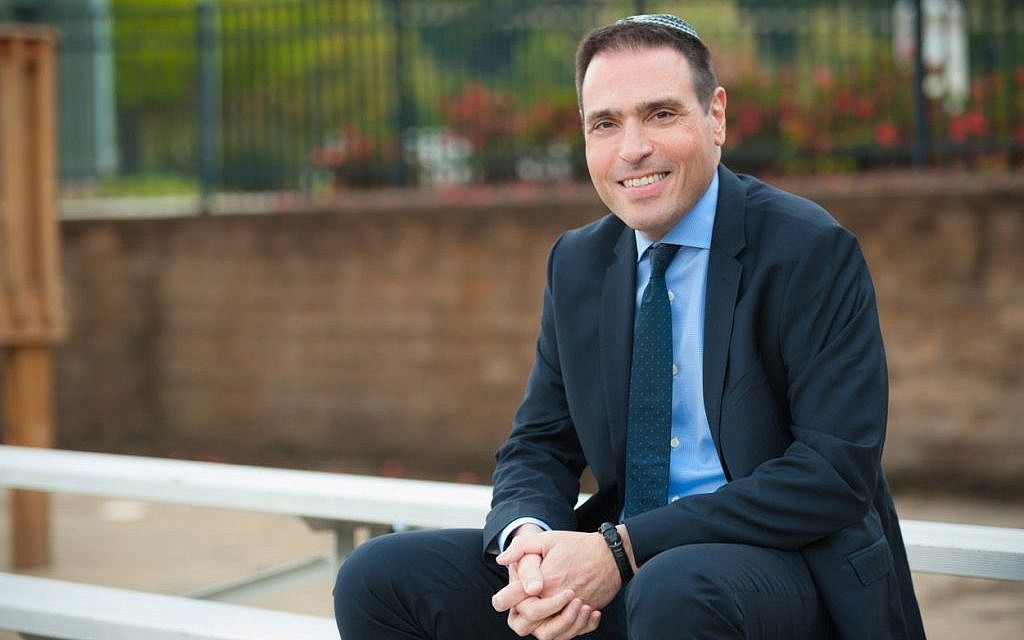
Harwitz shared a similar sentiment, saying that it is vital to ensure that a Jewish education doesn’t come at the cost of other opportunities.
“The core mission of Jewish education is that a family shouldn’t have to choose between a Jewish school and a camp or a synagogue or other meaningful experiences for their children,” he said. “These aspects are central to a child’s Jewish development, but also to the development and future of the Jewish people.”
Leubitz added that he believes a day school provides the opportunity to live Judaism in a way that many other opportunities cannot replicate.
“To go through a calendar year and feel all the holidays and celebrate and talk about them becomes part of a rhythm and experience,” he said.
Amy Shafron is head of The Davis Academy, a Jewish elementary and middle school. She shared insight into a number of growing education costs.
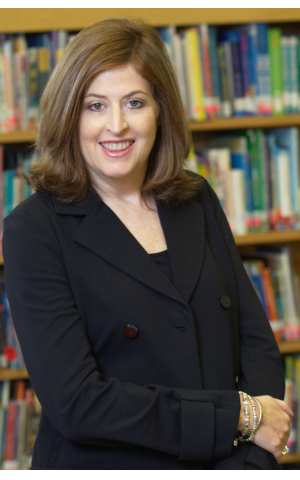
“The cost associated with education is a serious challenge for all Americans, … ensuring that schools can adequately and respectfully compensate their dedicated faculty and provide the best possible learning tools, … especially in the context of the more personalized and individualized setting of an independent school,” she said.
Leubitz said one of the perks of his position as head of school is seeing his school grow. It’s no small feat, but one that also creates fundraising issues. He suggested a possible solution – a large, potentially citywide endowment focused on educating future Jewish leaders.
“At times it feels like climbing up a hill in quicksand, because the more you work, the more you need,” he said. “For a community that values Jewish education, there is no endowment for the city, … and we could be a model for the country, if we say, ‘We’re putting our money where our mouth is, and really keeping it affordable for our families.’”
Harwitz agreed that keeping Jewish education affordable for all families would be among the greatest problems facing the Jewish community in the future.
“I believe that Atlanta is blessed with visionary philanthropic leadership, but the future of our community is reliant on our young people. It’s going to require continued and increased investment in education.”
While continuously fundraising to increase financial aid is one of his largest challenges, Leubitz added that it is not what bothers him most.
“What keeps me up at night is: how many families are not even coming to our door because of the cost?”
- Community
- Education
- Eddie Samuels
- The Epstein School
- Greenfield Hebrew Academy
- Yeshiva Atlanta
- Rabbi Ed Harwitz
- Amy Shafron
- Rabbi Ari Leubitz
- Gabriel Weiss
- Carly Judenberg
- atlanta jewish academy
- The Davis Academy
- The Weber School
- Walton High School
- John's Creek High School
- North Gwinnett High School
- Chamblee Charter High School
- Pope High School
- North Springs High School
- Riverwood International Charter School
- Westminster
- pace academy
- Woodward Academy
- The Galloway School
- School Rankings




comments